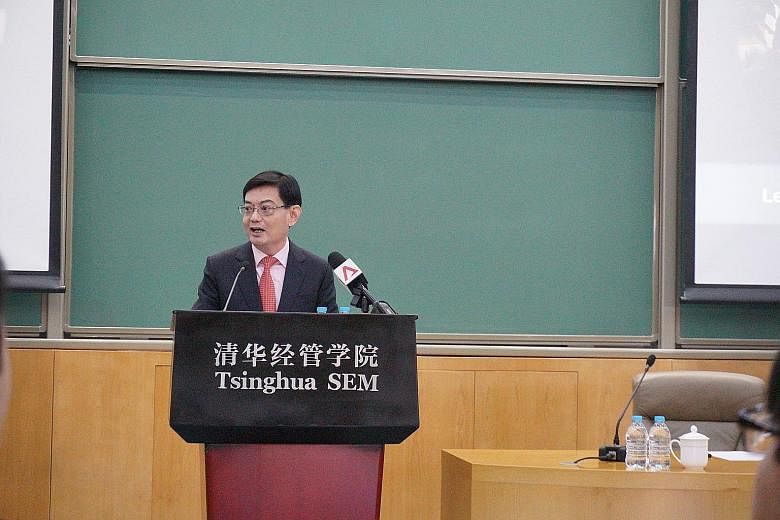There is a palpable buzz in the innovation scene in China, and opportunities are growing for Singaporeans to learn from and collaborate with their Chinese counterparts, Minister for Finance Heng Swee Keat said yesterday.
Singapore also has unique strengths, such as in legal and finance, that it should capitalise on to get a slice of the opportunities created by China's Belt and Road Initiative (BRI), Mr Heng told reporters at the close of his five-day trip to Suzhou and Beijing.
"I must say that it is a place that is full of buzz and full of young entrepreneurs as well as older ones who are working very well to think about what is the next stage of growth, what they can contribute and how they can better use technology to improve lives," he said. "I hope that we too can make a contribution in that area."
Reading the pulse of China's tech scene was a key goal of the trip for Mr Heng, who is the first minister from Singapore to visit China after last month's key party congress that put in place the country's top leadership for the next five years.
Among the places he visited were the Tsinghua University Science Park, where he saw the university's built-in ecosystem for turning ideas into commercial products, and Didi Chuxing's office, where he was briefed on how the ride-hailing giant uses big data and analytics with local governments to improve traffic flows.
He also officiated at the finals of a tech summit where nine start-ups, including three from Singapore, pitched their ideas to investors.
China's push for greater innovation also comes through various levels of its government, said Mr Heng, who met senior officials such as his counterpart Xiao Jie and Jiangsu party secretary Lou Qinjian during his trip.
"An area they have given a lot of thought to is the promotion of innovation - this is a topic that came across very strongly in all my meetings, both at the provincial level, as well as at the central government level," he said.
With more Chinese companies today looking at going global, a network of deep linkages with innovation hubs across the world is necessary to encourage more of them to use Singapore as a base for their internationalisation efforts.
To this end, the Global Innovation Alliance, which was launched in Beijing last Friday, will give Singapore entrepreneurs a chance to understand the Chinese market and build relationships, while serving as a sort of satellite campus for students to be exposed to China and "understand the buzz" happening here.
Mr Heng also said more Singaporeans need to be encouraged to go abroad "because the more they understand what is happening around our region and the global economy, the better prepared they will be to take on important roles ahead".
"Singaporeans - with our emphasis on bilingual education, with our emphasis on understanding a broad range of areas, a broad range of subjects - are actually very well placed to do this."
Singapore's traditional strengths also mean it can be a role player in the BRI to build infrastructure across much of the region, he added.
For instance, it can help write the rules setting out clearly the role of multilateral development banks like the World Bank and the Asian Infrastructure Investment Bank, structure projects so that risks are well understood and financing is sound across different stages, and standardise contracts to build predictability and lessen risk.
Getting the legal instruments right, such as for contracting parties to use a neutral body to be the dispute resolution centre, is also key, said Mr Heng.
Singapore aims to be this international arbitration hub, with the Ministry of Law working hard on this front, he added.
"If we can do this well, it will have a major impact," Mr Heng said, adding that the Government is also looking at different ways to expand trade flows, such as through trade and investment agreements and regulatory coordination.
Mr Heng said that as Asean chair next year, Singapore will look at ways to drive greater cooperation in new technologies, digitalisation and creative solutions.
It has designated 2018 as the Asean-China Year of Innovation.
Singapore will also seek to promote deeper understanding between the Chinese and the peoples of Asean, he said.
"The more our economies are closely integrated together, the more our security is interdependent, the more important it is for us to understand people from around the region and promote that friendship (all) across," he said.

